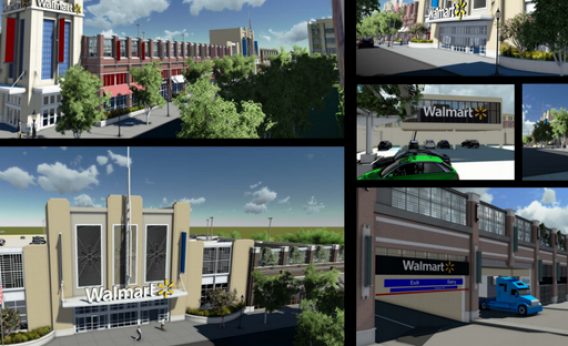Bryce Covert at ThinkProgress weighs in on the question of cities enacting regulations that dissuade Walmart from opening stores, concluding that on net new Walmarts don’t mean new jobs:
The lessons from the fallout of that battle have implications for DC. After the Walmart opened up on the west side of Chicago, economist Joseph Persky of the University of Illinois Chicago and his colleagues conducted a rigorous study of the impact on employment by going door to door for three annual surveys. They talked to businesses in the area that had overlapping product lines with the giant retailer before and after the opening. The study found that businesses in the immediate proximity of Walmart had about a 40 percent chance of closing in the two years following the opening. The chance of closing decreased the further away a business was from Walmart.
In jobs terms, Chicago looks to have more or less been a wash with the volume of new employment at Walmart just slightly higher than the volume of lost employment at stores Walmart drove out of business. One way of construing this is Covert’s way—the net benefits of new Walmarts to the labor market are smaller than the gross benefits. Another way of construing it is to help us understand who the real winners are from anti-Walmart regulations—the owners of businesses that compete with Walmart. The real losers, meanwhile, are the customers who evidently prefer the price/service mix offered by Walmart to that offered by competing firms.
The logic that consumer sovereignty should be the trump here can be contested. Tom Slee took this precise example as the centerpiece of his rather good book No One Makes You Shop at Walmart: The Surprising Deceptions of Individual Choice. Perhaps as individuals, DC residents would prefer the superior price/service mix offered by Walmart to that offered by competing firms, but as a collective we might have aesthetic or ethical reasons for wanting to bolster Walmart’s competitors.
For my part, though, I’ll say that I’d rather have better stores. I used to care about this quite a lot personally when I lived near the location of where one of the new Walmarts is being built. My local grocery store was a nice-looking but rather dismal Safeway that consistently offered long checkout lines, low staffing levels, and poor service from the staff that was on hand. The neighborhood was badly in need of some competition. Fortunately for me, that store is going to get built whether or not the anti-Walmart bill passes and now I live in a neighborhood where several non-Walmart grocery stores are under construction. But for example if the Skyland Town Center Walmart gets canceled, as seems likely, that’s going to be a boon for the nearby Discount Mart, CVS, and Safeway but probably not so good for people living nearby who might like a better place to shop.
